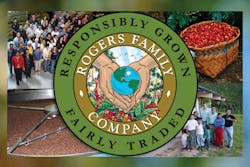The Rogers Family Co., a family-owned, Lincoln, Calif.-based roaster, packager, grower and seller of gourmet coffee products, has filed a lawsuit against Keurig Green Mountain, Inc. (Keurig) and successor to GMCR's former wholly-owned subsidiary, Keurig, Inc. in the U.S. District Court for the Eastern District of California for violations of federal and California antitrust and unfair competition laws.
Rogers' lawsuit follows its victory in a ruling March 12 by the U.S. Court of Appeals for the Federal Circuit. The Court of Appeals rejected Keurig's appeal and affirmed the U.S. District Court's 2013 decision (District of Massachusetts) that granted Rogers summary judgment that it did not infringe Keurig patents and that Rogers' OneCup single serve product is unique. The Rogers Family Co. launched OneCup – which uses a mesh filter instead of a plastic brewing pod – in fall 2011. The Rogers family last year launched OneCup BIO which is 97 percent biodegradable.
"We filed this lawsuit to end Keurig's anticompetitive practices which deny consumers access to our and other competitors' products," said Rogers Family Co. President Jon B. Rogers in a prepared statement. "Our goal is to ensure that consumers in the single-serve coffee market have access to a free and open marketplace, in which they are provided the opportunity to select a wide range of products based upon whatever factors are most important to them such as price, quality and commitment to social and environmental responsibility. No single company should be permitted to control consumer choice or prices through illegal, anti-competitive conduct."
In the suit which will seek damages as determined by the trial, The Rogers family alleges that Keurig has used its monopoly power in the single-serve coffee brewer and coffee pod markets to require its distribution partners to enter into exclusive anticompetitive agreements designed to maintain Keurig's monopoly power by excluding competition. In addition, according to the release, Keurig has announced plans to launch a new line in 2014 of single-serve brewers - Keurig 2.0 - that Keurig has stated will contain lockout technology to prevent Keurig 2.0 brewers from functioning with competitors' coffee pod products. The Rogers family says that according to Keurig, the Keurig 2.0 brewers would replace its existing lines of Keurig brewers that function with competing coffee pod products. In addition, Rogers' lawsuit alleges that Keurig has made false, disparaging comments about Rogers' coffee pod products and has already begun to try to persuade distributors and retailers not to purchase Rogers' and other competitors' coffee pods based on representations that they will not function with the forthcoming Keurig 2.0 brewers.
The Rogers Family Co. asserts that Keurig's actions have harmed and will continue to harm consumers by restricting consumer choice and by allowing Keurig to impose supra competitive prices for its pod products.
The legal case – which involves a $4 billion coffee company approximately 25 times larger than the relatively small Rogers Family Co. – has been followed nationally because of the high stakes not only for the industry but also for consumers. The single-serve market is the fastest-growing segment of the multi-billion dollar coffee industry which is second only to oil as a commodity, according to the release.
Keurig filed its lawsuit against Rogers in 2011. And on May 24, 2013, U.S. District Judge F. Dennis Saylor, IV of the District of Massachusetts ruled that Rogers did not infringe the three patents asserted by Keurig. Keurig appealed to the Federal Circuit.
"When Keurig sued us they told our customers and the industry that our products infringed their patents, that we copied their design and that consumers should not use our products," added Jon B. Rogers. "I said that the Keurig complaint was without merit and the court agreed with my assessment and granted judgment in our favor on all claims. This is a great victory not only for our customers but for all coffee consumers." Full article.






